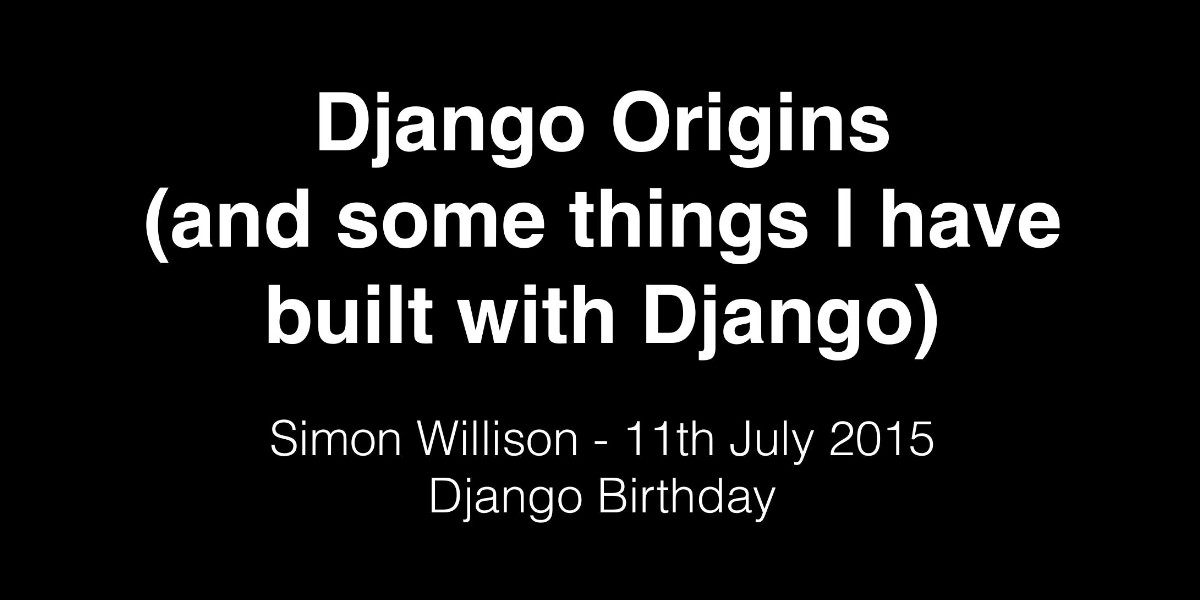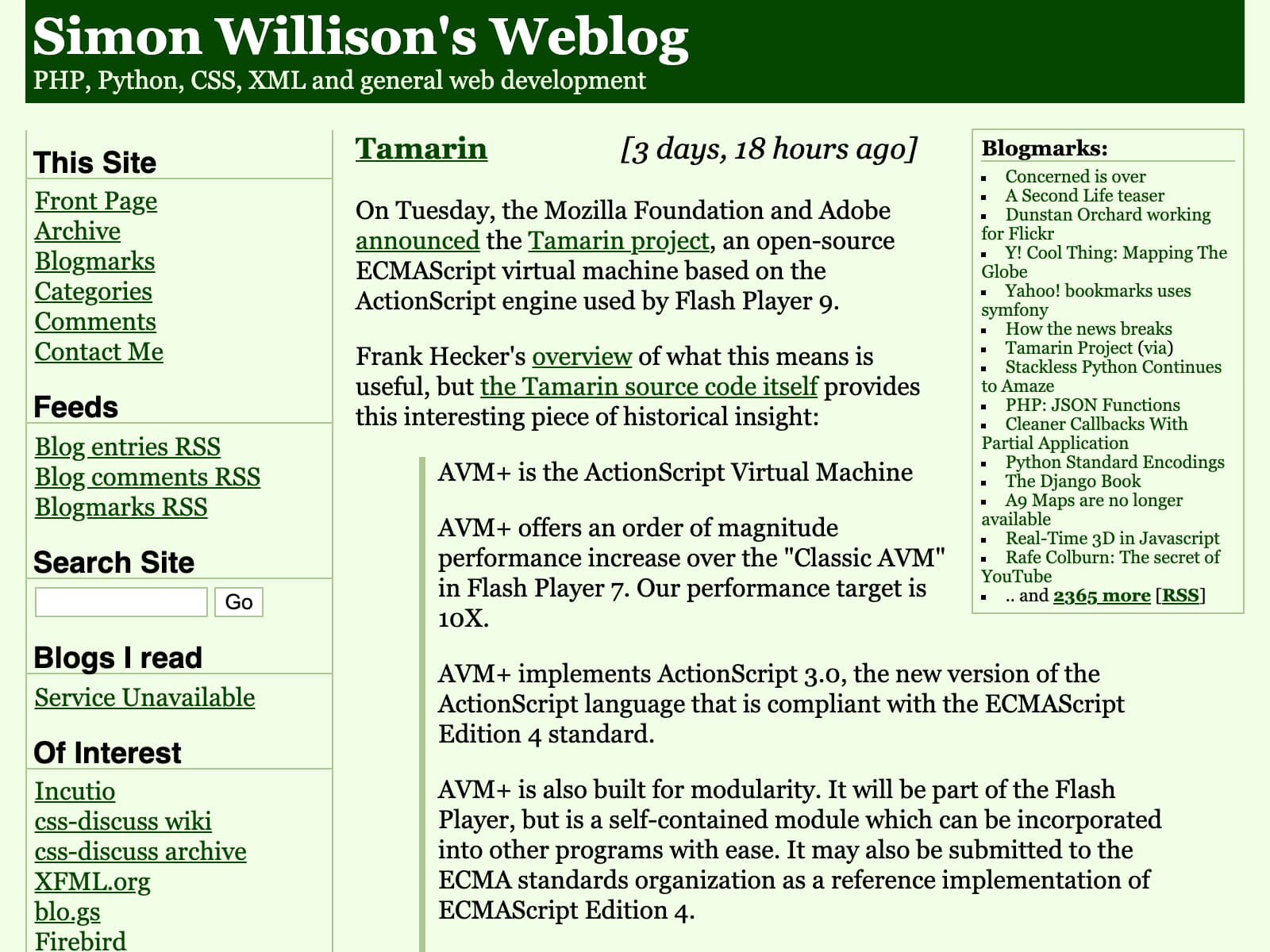45 posts tagged “adrian-holovaty”
2025
Talk Python: Celebrating Django’s 20th Birthday With Its Creators. I recorded this podcast episode recently to celebrate Django's 20th birthday with Adrian Holovaty, Will Vincent, Jeff Triplet, and Thibaud Colas.
We didn’t know that it was a web framework. We thought it was a tool for building local newspaper websites. [...]
Django’s original tagline was ‘Web development on journalism deadlines’. That’s always been my favorite description of the project.
Happy 20th birthday Django! Here’s my talk on Django Origins from Django’s 10th
Today is the 20th anniversary of the first commit to the public Django repository!
[... 8,994 words]Adding a feature because ChatGPT incorrectly thinks it exists (via) Adrian Holovaty describes how his SoundSlice service saw an uptick in users attempting to use their sheet music scanner to import ASCII-art guitar tab... because it turned out ChatGPT had hallucinated that as a feature SoundSlice supported and was telling users to go there!
So they built that feature. Easier than convincing OpenAI to somehow patch ChatGPT to stop it from hallucinating a feature that doesn't exist.
Adrian:
To my knowledge, this is the first case of a company developing a feature because ChatGPT is incorrectly telling people it exists. (Yay?)
2024
State-of-the-art music scanning by Soundslice. It's been a while since I checked in on Soundslice, Adrian Holovaty's beautiful web application focused on music education.
The latest feature is spectacular. The Soundslice music editor - already one of the most impressive web applications I've ever experienced - can now import notation directly from scans or photos of sheet music.
The attention to detail is immaculate. The custom machine learning model can handle a wide variety of notation details, and the system asks the user to verify or correct details that it couldn't perfectly determine using a neatly designed flow.
Free accounts can scan two single page documents a month, and paid plans get a much higher allowance. I tried it out just now on a low resolution image I found on Wikipedia and it did a fantastic job, even allowing me to listen to a simulated piano rendition of the music once it had finished processing.
It's worth spending some time with the release notes for the feature to appreciate how much work they've out into improving it since the initial release.
If you're new to Soundslice, here's an example of their core player interface which syncs the display of music notation to an accompanying video.
Adrian wrote up some detailed notes on the machine learning behind the feature when they first launched it in beta back in November 2022.
OMR [Optical Music Recognition] is an inherently hard problem, significantly more difficult than text OCR. For one, music symbols have complex spatial relationships, and mistakes have a tendency to cascade. A single misdetected key signature might result in multiple incorrect note pitches. And there’s a wide diversity of symbols, each with its own behavior and semantics — meaning the problems and subproblems aren’t just hard, there are many of them.
2022
Let websites framebust out of native apps (via) Adrian Holovaty makes a compelling case that it is Not OK that we allow native mobile apps to embed our websites in their own browsers, including the ability for them to modify and intercept those pages (it turned out today that Instagram injects extra JavaScript into pages loaded within the Instagram in-app browser). He compares this to frame-busting on the regular web, and proposes that the X-Frame-Options: DENY header which browsers support to prevent a page from being framed should be upgraded to apply to native embedded browsers as well.
I’m not convinced that reusing X-Frame-Options: DENY would be the best approach—I think it would break too many existing legitimate uses—but a similar option (or a similar header) specifically for native apps which causes pages to load in the native OS browser instead sounds like a fantastic idea to me.
Twenty years of my blog
I started this blog on June 12th 2002—twenty years ago today! To celebrate two decades of blogging, I decided to pull together some highlights and dive down a self-indulgent nostalgia hole.
[... 4,455 words]2010
What is the history of the Django web framework? Why has it been described as “developed in a newsroom”?
I was there!
[... 674 words]2009
Data Is Journalism: MSNBC.com Acquires Everyblock. Congratulations Adrian, Wilson and the team! Brady Forrest reports the acquisition within the larger context of the rise of data-driven journalism.
Django tip: Caching and two-phased template rendering. Neat trick for expensive pages which can be mostly cached with the exception of the “logged in as” bit—run them through the template system twice, caching the intermediary generated template.
The Django Book: Version 2.0 (via) Adrian’s working on a new edition of the Django Book updated to cover version 1.0. As with the first edition, it will be available free online in addition to a published Apress paperback. The first three chapters are now available.
2008
Django tickets with keyword “djangocon”. Adrian and Jacob ran an “I want a pony” session during their closing keynote at DjangoCon—I’ve filed the feature requests as tickets tagged with the “djangocon” keyword.
Cyberstar. Adrian made the front cover of the Chicago Tribune magazine!
themaneater.com Launch. The Maneater’s online edition is where Adrian cut his web development teeth, so it’s great to see them up and running on Django. Important to note that KeepAlive can completely murder Apache/Django performance.
Introducing EveryBlock. EveryBlock launched! Adrian Holovaty, Wilson Miner, Paul Smith and Daniel X. O’Neil’s startup which answers the question, “What’s happening in my neighborhood?” Cities covered by the launch are Chicago, New York and San Francisco.
Chatting with Adrian Holovaty. Fabio Akita interviews Adrian about Django and related topics.
2007
“The Definitive Guide to Django” is now shipping from Amazon. The book looks absolutely fantastic (bias disclosure: I contributed the newforms chapter)—huge congratulations to Adrian and Jacob.
Django Book Update. It’s done! Went to the printer on Friday, due in bookstores in the second week of December (just in time for Christmas). Congrats to Adrian and Jacob.
Knight Foundation grant. Adrian’s leaving the Washington Post to found EveryBlock, a startup focusing on local news and information in the style of chicagocrime.org.
Web Focus Leads Newspapers to Hire Programmers for Editorial Staff. It’s great to see this trend taking off. A newsroom is an excellent place to work as a programmer.
2006
Graphing requests with Tamper Data
I spent the weekend in Boston, speaking at GBC/ACM’s Deep Ajax seminar with Alex Russell and Adrian Holovaty. I’ll be posting some notes on this later, but I wanted to share a really neat Firefox extension that Alex showed me: Tamper Data.
[... 318 words]The programmer as journalist. An interview with Adrian Holovaty.
How I’m using Amazon S3 to serve media files. Adrian’s saving server overhead on ChicagoCrime by serving media from S3.
2005
Exciting developments with Django
The amount of activity surrounding the Django web framework since its not-quite release a few weeks ago is amazing. Adrian, Jacob and Wilson have been working over-time, with 395 check-ins to source control since the 13th of July. They’ve added WSGI support, a development web server, unit-tests, a ton of documentation, SQLite support, database introspection and dozens of other feature tweaks and bug fixes. Check out the project Timeline for an idea of just how frenetic things have been.
[... 271 words]Adrian is leaving the Journal-World. This opens an excellent Python job opportunity in Kansas.
Introducing Django
You may know that I spent a year working in Kansas for a local newspaper—the Lawrence Journal-World. I’m delighted to announce that a decent chunk of the software I worked on there is now available as open-source, in the form of the Django web framework.
[... 614 words]Why Greasemonkey is good for publishers (via) Free usability tips and bug fixing—your users know more than you do.
Again, a newspaper PDF experiment is fatally flawed. Adrian nails the reason PDF editions will always play second fiddle to the real web.
2004
’Game’: Fun with databases. Adrian discusses our latest site launch.
2003
Installing psycopg on Red Hat 9
Adrian Holovaty and I spent some time today figuring out how to get the psycopg Postgres module to install on Red Hat 9. It took a while, but eventually we tweaked the spec file and used it to compile our own RPM. I’ve posted our modified spec file to the psycopg mailing list. More for my own record than anything else, the arcane incantations needed to create the RPM went roughly as follows:
[... 151 words]Lawrence web meetup
My colleague Adrian is putting together a meetup for web designers and developers in the Lawrence, Kansas area on Monday evening. The venue is yet to be decided but we’re looking to book somewhere for dinner with an atmosphere that’s conducive to lively conversation. Likely attendants so far include Adrian Holovaty, Travis Beckham, Anitra Pavka, Dan Cox (designer for ljworld.com, lawrence.com and kusports.com) and myself. If you’re a web developer/designer in the area and this sounds like your kind of thing drop Adrian a line for more information. It should be a lot of fun.
[... 121 words]
